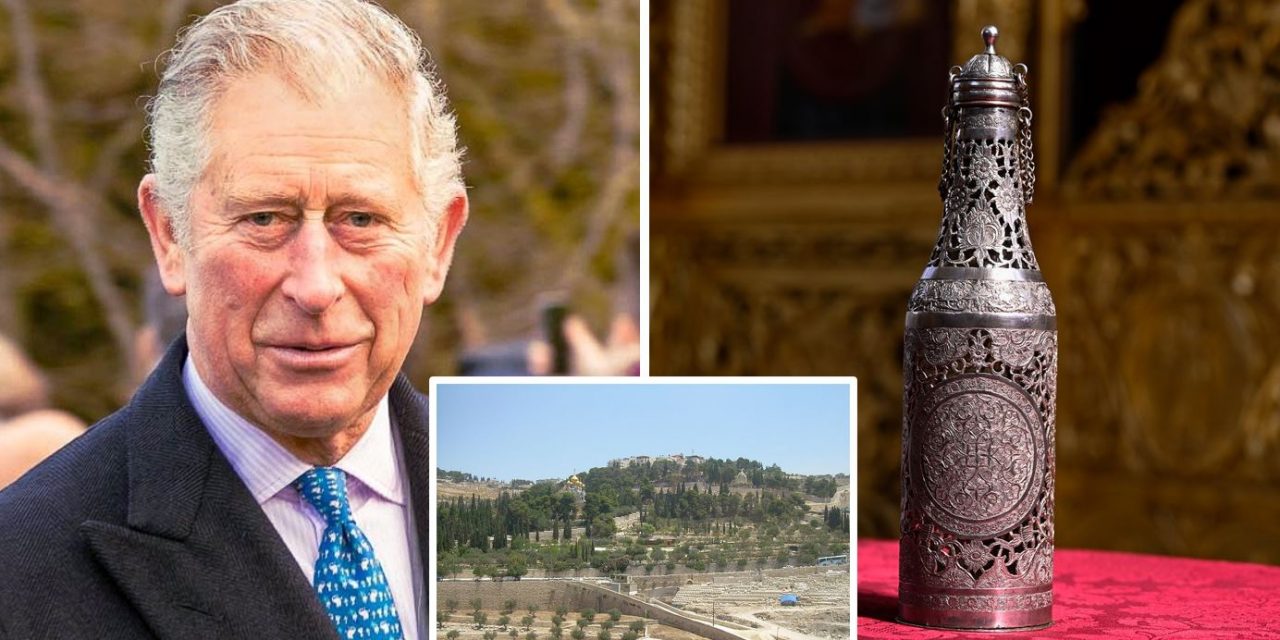The anointing oil to be used at King Charles’s Coronation has been sourced from the Mount of Olives in Jerusalem. Harvested from two olive groves on the mount, the holy oil was consecrated at the Church of the Holy Sepulchre on Friday.
It is based on the same ingredients as the oil used at the 1953 coronation of Queen Elizabeth II, containing olive oil, fragrance rose and orange blossom and is based on a formula “which has been used for hundreds of years,” according to the palace. Charles’s grandmother Princess Alice of Battenberg is interred at the Russian Orthodox Church of St. Mary Magdalene at the Mount of Olives.
“From ancient kings through to the present day, monarchs have been anointed with oil from this sacred place,” Archbishop Justin Welby said. “As we prepare to anoint the king and the queen consort, I pray that they would be guided and strengthened by the Holy Spirit.”
Biblical roots of the Coronation
The act of anointing an English monarch with holy oil can be traced back to the 7th and 8th centuries. But its roots go back to Bible times.
The sourcing of the anointing oil from Jerusalem and other Biblical symbolism is another reminder of the Judeo-Christian roots of Britain’s Christian traditions. When the ancient kings of the different parts of England embraced Christianity, they looked to the Bible as a model build their kingdoms. By swearing covenantal promises to acknowledge Christ’s reign and God’s law, they hoped to enter into the same blessings as Israel. Notably, they didn’t look to the monarchies of other nations – they looked to Israel.
It’s hoped that the Coronation of King Charles will follow the same Biblical tradition as that witnessed at the Coronation of his mother, Queen Elizabeth II. On that occasion, following hundreds of years of tradition, Queen Elizabeth was anointed in a moment regarded so sacred that a canopy was placed over her to hide the anointing of holy oil from public viewing. The then Archbishop made the following proclamation over her, citing the words of King Solomon;
“Be thy hands anointed with holy oil.
“Be thy breast anointed with holy oil.
“Be thy head anointed with holy oil, as kings, priests, and prophets were anointed:
“And as Solomon was anointed king by Zadok the priest and Nathan the prophet, so be thou anointed, blessed and consecrated Queen over the peoples, whom the Lord thy God hath given thee to rule and govern, in the name of the Father, and of the Son, and of the Holy Ghost. Amen.”
The traditions carried out at the Coronation ceremony are steeped in Biblical examples. For instance, 2 Kings 11:12-14 states, “And he brought out the king’s son, put the crown on him, and gave him the Testimony; they made him king and anointed him, and they clapped their hands and said, “Long live the king!”
After the anointing, the ceremony leads to the crowning and then a Benediction. At the Coronation Queen Elizabeth II, the Archbishop said a prayer beginning with the words “God crown you with a crown of glory and righteousness”
In David’s Psalm describing the king, it is said that God “meets him with the blessings of goodness;
You set a crown of pure gold upon his head.” (Psalm 21:3). This demonstrates that a monarch’s authority and rule over a kingdom is in fact delegated to him by God who is Sovereign. A similar picture is depicted by the royal robe, representing righteousness, the orb, symbolising Christ’s sovereignty over the world, and the two scepters, one representing God’s justice and the other His mercy.
But another emblem of Biblical symbolism remains somewhat of a mystery. The Stone of Destiny or Stone of Scone, first used by King Edward I is placed underneath the oak coronation chair. It is kept in Scotland, but is brought to London especially for Coronation. This 16 inch wide sandstone is similar to one found near Bethel. There is a tradition that Jacob used the stone as a pillow when he had the dream of angels ascending and descending the staircase that reached into heaven. Jacob blessed and anointed the stone with oil. The mention of a pillar stone in the kingly anointings in 2 Chronicles 23 and 2 Kings 11 have raise speculation that it could be related.
Our hope and prayer that the Bible will remain very much central to King Charles’s Coronation and that the significance of his ‘Jerusalem anointing’ will lead him in turn to bless Israel during his reign.
The Coronation oil is based on the oil used at the Coronation of Queen Elizabeth II, the formula of which has been used for hundreds of years.
It will also be used for the anointing of Her Majesty The Queen Consort.
[3/3] pic.twitter.com/ZNVpDgV2pV
— The Royal Family (@RoyalFamily) March 3, 2023

This year, we want to do more to bless Israel and the Jewish people.
We know that as we bless Israel this year, God will bless us, just as He promised in Genesis 12:3, “I will bless those who bless you, and whoever curses you I will curse; and all peoples on earth will be blessed through you.” Now is the time to bless Israel and the Jewish people.









